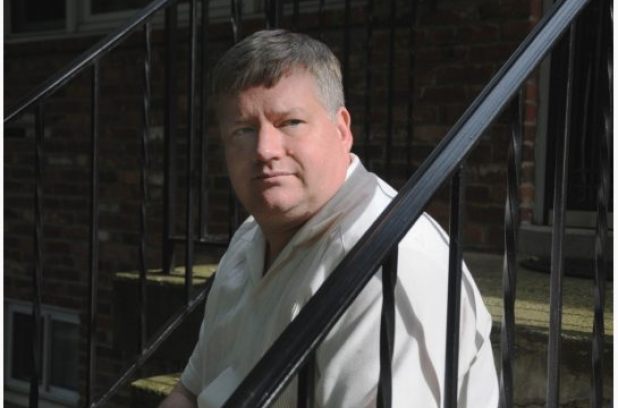Staff Torstar News Service
GUANTANAMO BAY U.S. NAVAL BASE, CUBA — Twice a day, when the clock hits 9:11, Stephan Gerhardt thinks of his brother Ralph.
In the driveway behind his Virginia home sits his little brother’s 1991 red BMW. It’s in mint condition, the only upgrade from the days when Ralph drove the car are the new Virginia plates that read “CDA EH?”

Stephan Gerhardt, at his home in Falls Church, Virginia, prepares for a trip to the U.S. naval base at Guantanamo Bay, Cuba for this week’s hearings for the five accused planners of the September 11 attacks. His brother Ralph died in the World Trade Center towers. Torstar News Service
But even if there weren’t enough to trigger memories of his only sibling and the morning of September 11, 2001, Gerhardt’s business — he books conventions in the tourism industry — serves as a constant reminder.“There’s not a day goes by that someone doesn’t reference 9/11. Whether it’s through airport security issues, whether it’s through occupancy issues or market trends … it can come up,” the 47-year-old says.
“So if you lost your brother or your sister in a car accident or to some medical issue, you’d always have that loss. But it’s not a national headline, it’s not going to come up and bite you, randomly throughout your day” — he stops as his voice breaks — “every day of your life.”
On Sunday, Gerhardt arrived here at the U.S. base on Cuba’s southeast coast where his personal story and the larger Guantanamo story collide. He is the first Canadian relative of a September 11 victim to witness the hearings for the five detainees accused of orchestrating the attacks.
Ralph Gerhardt, 34, was one of 24 Canadians killed in the September 11 terror attacks. He was a vice-president at Cantor Fitzgerald and worked on the 105th floor of Tower One at the World Trade Center with his girlfriend, Linda Luzzicone.
The last call he made to his father Hans was at 8:52 a.m. that morning “We either got hit by a bomb or a plane,” he said. “I’m OK. We are OK. I love you, but I have to go now.”
Ralph and Linda’s names are now etched together on the walls of New York’s Ground Zero memorial pools.
Stephan Gerhardt, who spent the weekend preparing for the trip to Cuba, was raised with his brother in Toronto and Etobicoke, living for a stint at the Sutton Place Hotel when his father, Hans, was the hotel’s general manager. He moved to Washington 19 years ago for a job in Canada’s embassy. In 2002, he started his own business and works from home.
Interviewed by Torstar News Service in his living room about what some lawyers have dubbed the trial of the century, he said, “I’m ready to go.”
“I’ve got everything as organized emotionally as I can. I know it’s not going to be an easy week. I’m not expecting it to be. … I don’t want to say I need to go but I feel I should,” he said.
“I have no idea what I’m really going to go through because it’s one of those things you can’t really plan for.”
Behind him is his and [sic] beloved train collection and in the corner an unfinished Lego set of the Taj Mahal. This is the way he unwinds. “I like my toys,” he says, grinning.
Relatives of those killed on September 11 have been coming to Guantanamo since the end of 2008, just months before U.S. President Barack Obama’s inauguration and his pledge to close this prison.
Sometimes their presence serves as the only reminder of that day, as politics and legal challenges drag out pretrial in a place that shows no signs of closing, despite Obama’s promise.
Five men — self-professed mastermind Khalid Sheikh Mohammed among them — were arraigned in May 2012 on charges of murder and terrorism for the deaths of 2,976 [sic] people who died when hijackers smashed four airlines into the New York towers, the Pentagon and crashed in a field in Pennsylvania.
Pentagon prosecutors are pushing for their trial to start in September 2014. Defence lawyers say that date is wildly optimistic for death penalty cases.
“There is no way this case is getting to trial by then,” defence lawyer Cheryl Bormann said at a news conference Sunday night. “I believe the prosecution knows that but this is politics.”
The majority of motions being fought this week deal with the logistics of holding a trial on this offshore base and the legality of the post-September 11 military commissions.
Defense lawyer James Connell told journalists he was only recently allowed to visit his client, Ammar al Baluchi, in the secretive Camp 7 somewhere on the base.
On Monday morning, a double pane of Plexiglas will separate Gerhardt and the other relatives in the windowless courtroom from Baluchi, his uncle Khalid Sheikh Mohammed and three Yemenis: Walid bin Attash and Ramzi bin al Shibh and Saudi Mustafa al Hawsawi.
Gerhardt says he is simply happy to see a trial going forward, no matter how long that takes or where it is held.
“I’d rather have somebody have too many rights and too many chances then have their rights taken away from them,” he said.
“It’s so much a part of my life and the American story right now, you know ‘Gitmo this, Gitmo that.’ It’s part of our politics,” he said. “I just want to go and see what it’s like and see what it really is.”

